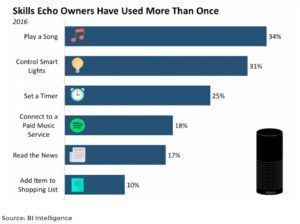Hey Siri, can you help yourself?

How Siri blew its lead in the race to become the ultimate virtual assistant
Siri was one of the first widely used voice-enabled AI assistants after Apple bought the start-up and released Siri on its iPhone 4S. In 2011, it had a few years head start on the other big tech players, but today, Siri has fallen behind its competitors both in terms of knowledge and skills and distribution.
Knowledge and Skills: Since Siri is built into the iPhone, it can make phone calls, send text messages, update your calendar etc. But its access to third party (3P) apps is relatively limited and up until 2016 it was nonexistent. This has put Siri at a huge disadvantage relative to its competitors.
- Alexa: Amazon’s Alexa is miles ahead of Siri with regards to 3P apps with over 7,000 “skills” as of January 4, 2017 after launching in 2015[1]. Alexa is still confined to the home, but the use cases for Alexa outside of communications far exceed those of Siri, in part due to its massive brain that grows with every skill. Apple only recently allowed 3P developers to start working on Siri and it’s still a relatively closed system compared to Alexa.
- Google Assistant: Google has also announced that it will allow 3P developers to work on Google Assistant, and Google sits on a treasure trove of data from Google’s search engine as well as Gmail, calendar, etc. Furthermore, the presence of Google Assistant on Android devices erodes Siri’s communications advantage.
Siri wasn’t always this “close-minded”. When Apple purchased the company, Siri was able to connect to 42 different web services[2]. This knowledge base made up a significant part of Siri’s “brain”, but after Apple bought Siri it removed these capabilities. This decision is not surprising given Apple’s preference for a tightly controlled closed system, but given that so much voice innovation today is happening on open platforms Siri is not set up for success.
Distribution: Siri has a user base of over 100M iPhones in the US[3] giving it some advantage over competitors that haven’t gone mobile, but iOS’s market share is dwarfed by Google’s Android and Apple is notably behind on entering the home.
- Alexa: Amazon launched Alexa on the Echo speaker so most of Alexa’s current use cases revolve around the home where Siri has a notably weak presence. Since Amazon cares about increasing usage of Alexa regardless of platform it is not restricted to Amazon products. Alexa was practically omnipresent at the 2017 CES appearing in smart home devices by Samsung and LG as well as various startups[4]. To date, Siri’s main advantage over Alexa is its availability on the iPhone. However, Amazon has already made moves into mobile by announcing that Alexa will be available on its next FireHD tablet[5], and in February Alexa will become available on a phone for the first time with the release of the Huawei Mate 9[6].

- Google: ~80% of 2015 global mobile phone shipments used the Android OS. Prior to the Apple acquisition, Siri had reached an exclusive deal with Verizon to make it a default app on all Android devices, however Apple unsurprisingly voided the agreement and made sure that Siri would be exclusive to Apple devices, thus giving Apple an early advantage with iPhone 4S sales, but potentially hurting it in the long run.[7]
Apple’s value capture mechanism for Siri is unclear. At launch, it probably helped to sell iPhones since it was a novel feature, but with Google Assistant on Android devices as well as the proliferation of virtual assistant apps, AI assistants have become table stakes for phones. To add insult to injury, you can ask Alexa to purchase an iPad from Amazon but when you ask Siri to buy an iPad she says “Apple.com should be able to help you with that.”
As an outsider, it’s hard to say exactly what went wrong but I believe the initial decisions to keep Siri closed off from 3P development and make it exclusive to iOS hampered Siri’s ability to get smarter quicker and increase its user base. Some posit that corporate politics may have also played a role and that Siri may lack a corporate champion since there has been so much leadership turnover within the division[8].
When I asked Siri what she thought about all this she just said, “That’s nice of you to ask, but it really doesn’t matter what I think” and therein lies the rub.
[1] http://www.geekwire.com/2017/amazons-alexa-now-tops-7000-skills-a-7x-increase-in-7-months/
[2] http://www.huffingtonpost.com/2013/01/22/siri-do-engine-apple-iphone_n_2499165.html
[3] http://expandedramblings.com/index.php/iphone-statistics/
[4] http://www.digitaltrends.com/home/alexa-devices-ces-2017/
[5] http://www.theverge.com/circuitbreaker/2016/9/8/12818246/amazons-alexa-finally-comes-to-mobile-but-not-how-you-might-expect
[6] http://www.theverge.com/circuitbreaker/2017/1/5/14154058/huawei-mate-9-us-pricing-availability
[7] http://www.huffingtonpost.com/2013/01/22/siri-do-engine-apple-iphone_n_2499165.html
[8] http://www.huffingtonpost.com/2013/01/22/siri-do-engine-apple-iphone_n_2499165.html




I think your assessment that Siri floundered because of Apple’s closed-mindedness toward third party development makes sense, especially given what we learned about companies like Nokia. It’s surprising to me that Apple didn’t learn this lesson the first time with the App store, when it finally decided to open up the software to any developer and saw a proliferation of Apps and App usage.
I also wonder whether or not this is an instance of wrong place, wrong time. It’s kind of like the early social networks – it seems like an interesting piece of technology in theory, but the average consumer doesn’t exactly know what to do with it, and therefore ignores it. Not until the second or third player comes on the scene do mainstream adopters start to see the value proposition of the service. Sadly, Apple might have taken the hit here in order to make voice AI more widely understood.
Seanna – Thanks for the insightful post on how Siri has lost the game against Alexa and Google Assistant so far. It’s interesting to see how Apple’s close mindedness clipped away its capabilities. I have always been curious to understand how this space of ‘Conversational Commerce’ will evolve. Is it going to be a winner-takes-all market? Or will all – Alexa, Google Assistant, Siri, Cortana, etc. – claim their fair share of the pie, because they indeed exist on different form factors? Would love to know your thoughts on the same.
Also, you might have seen already – the creators of Siri (who then sold Siri to Apple) create another personal assistant ‘Viv’ (which they claim is 20x better than Siri) and sold it to Samsung recently. This adds another player to the race as Samsung thinks about speeding up its AI game.
Here’s a TechCrunch article about Viv:
https://techcrunch.com/2016/10/05/samsung-acquires-viv-a-next-gen-ai-assistant-built-by-creators-of-apples-siri/
I think your point about distribution is really important. It was significant that Alexa was launched on the Echo device (as Google did on its device well) as opposed to being included as part of a device meant for other uses (Siri and the iPhone). With this launch approach, consumers were choosing to purchase a device because of its voice technology, which I think helped with adoption and usage. It didn’t get lost among all of the other things a consumer does on their phone. Once consumers became comfortable using a simple home device made for voice, Amazon could extend this technology to other smart home devices as well as mobile as you mentioned. Apple consumers on the other hand, only found Siri distracting as they were using their phone for other reasons. This is a good example of when forcing distribution and usage does not work.